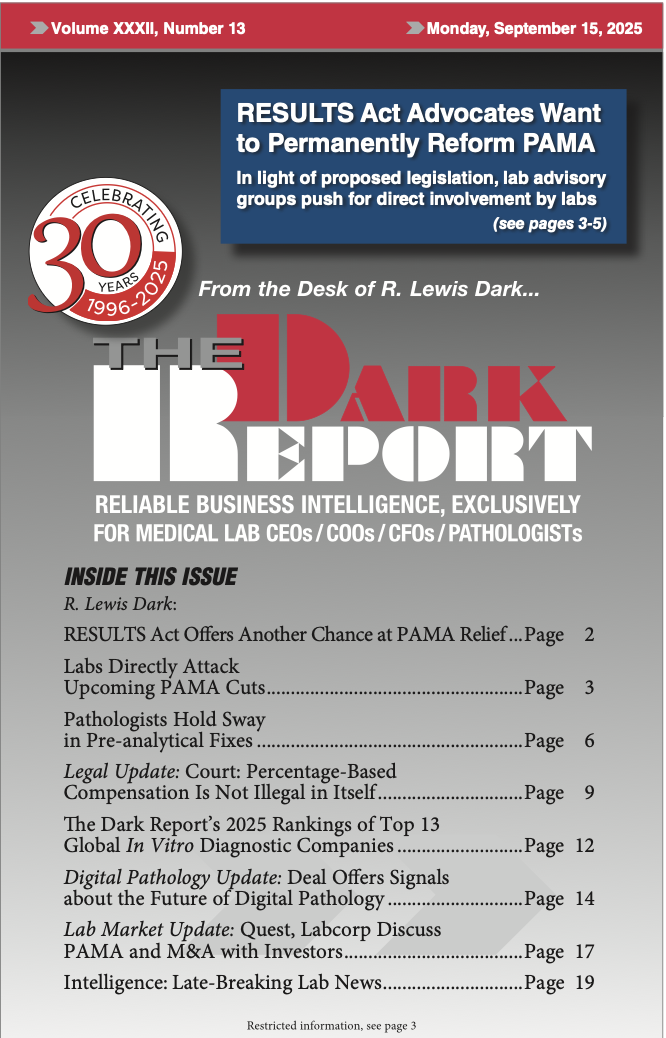Robert Michel
 Until Robert L. Michel came along and founded The Dark Intelligence Group (DIG) two decades ago, the clinical laboratory industry and the anatomic pathology profession lacked a trustworthy source for information about the management and operations of medical laboratories. From its inception in 1995, The Dark Report quickly became the “go to” source of industry intelligence, innovations in lab management, and strategic market analysis.
Until Robert L. Michel came along and founded The Dark Intelligence Group (DIG) two decades ago, the clinical laboratory industry and the anatomic pathology profession lacked a trustworthy source for information about the management and operations of medical laboratories. From its inception in 1995, The Dark Report quickly became the “go to” source of industry intelligence, innovations in lab management, and strategic market analysis.
This excellence in reporting has earned recognition from his peers. For example, twice Michel and The Dark Report have won national awards for best investigative reporting by the Specialty Information Publishers Association. In 2005, the award was for Michel’s coverage about how the anatomic pathology condominium laboratories (pod labs) operated by urologists and gastroenterologists came to be, who operated them, and how these owners marketed the AP condo labs to other physician groups. In 2009, Michel’s award for best investigative reporting resulted from his published interviews with Quest Diagnostics Incorporated when the company admitted that, for a period of 18 months, it had been reported inaccurate Vitamin 25(OH) D results because of problems with its laboratory-developed test methodology. The Dark Report’s story was picked up by The New York Times and was in the national news cycle for several days.
In his role as Editor-in-Chief, Michel brought unique capabilities to DIG and The Dark Report. His management training and diverse business experience—along with his skills as a concise writer and analyst—proved to be a winning combination for readers of The Dark Report. For that reason, Michel’s story has many intriguing elements.
Immediately prior to founding DIG, he had served in several executive positions for Nichols Institute based in Portland, Oregon, and San Juan Capistrano, California. This was during the time that Nichols Institute was an independent public lab company with annual revenues of about $280 million (prior to its acquisition by MetPath, Inc., now Quest Diagnostics Incorporated). He traveled extensively to many of the clinical lab business units owned by Nichols Institute in different regions of the United States and played a role in formulating effective market strategies in response to the emergence of closed-panel HMOs, capitated pricing, and full-risk managed care contracts, among other successful management initiatives.
Prior to his service at Nichols Institute, Michel served at three different Fortune 100 companies. These were Procter & Gamble, Centex Corporation, and Financial Corp. of America. Each was an opportunity to master new management techniques and apply them in different industries. Between these positions, he gained experience as an entrepreneur, having founded a real estate development firm and a general contracting company in the Southeastern United States.
Robert Michel earned a Bachelor of Arts degree in Economics at the University of California, Los Angeles, where he played rugby, a sport he participated in for another 22 years. He is a native of California and grew up in Santa Ana.
Articles by Robert Michel
May 22, 2006 “Intelligence: Late Breaking Lab News”
Another investment firm has acquired an anatomic pathology company. It was announced today that Water Street Capital Partners of Chicago, Illinois, has acquired a majority ownership in Lakewood Pathology Associates, located in Lakewood, New Jersey. Under new ownershi…
Seoul, Korea Hosts Lab Automation Meeting
From the Volume XIII No. 6 – May 1, 2006 Issue
CEO SUMMARY: It was the fifth “International Conference on Laboratory Automation and Robotics.” Over the past decade, this meeting, started by the pioneers of clinical laboratory automation, has been the major forum to meet and discuss advances in all aspects of automation. This confe…
Conference Speeches Offer Useful Insights
From the Volume XIII No. 6 – May 1, 2006 Issue
CEO SUMMARY: There is an interesting dichotomy between Asia and North America. The same problems and challenges exist in both regions—declining reimbursement and budgets, labor force issues, and the need to spend more for new diagnostic technology. Yet laboratories in both regions see a…
Tour of Korean Labs Has Plenty to Teach
From the Volume XIII No. 6 – May 1, 2006 Issue
CEO SUMMARY: Faster turnaround times and better quality seem to be some common motivations for installing automation in the three Korean labs visited by THE DARK …
Lab Automation Pioneer Assesses Outcomes
From the Volume XIII No. 6 – May 1, 2006 Issue
CEO SUMMARY: Debate has dogged the subject of laboratory automation since its earliest days. That was true during the early 1990s in Japan. It was true in Canada and the United States throughout the 1990s. It is still true in this decade. That is why it was startling to hear a founding fa…
May 1, 2006 “Intelligence: Late Breaking Lab News”
From the Volume XIII No. 6 – May 1, 2006 Issue
Lots of news unfolding across the lab industry. Here’s a round-up of recent and noteworthy items: NEW VENTURES • Persistent rumors indicate that a new national ana…
CYP450 Testing To Have Major Clinical Impact
From the Volume XIII No. 5 – April 10, 2006 Issue
CEO SUMMARY: Pharmacogenomics, companion diagnostics, “personalized prescription drug therapy”—by any name, use of molecular diagnostics to guide clinicians in the prescribing and dosing of drugs is about to expand exponentially. Some experts predict that CYP450 testing alone will …
CYP450 Plays Major Role In Drug Metabolization
From the Volume XIII No. 5 – April 10, 2006 Issue
CEO SUMMARY: Each year, over 100 million new prescriptions are written for two classes of drugs with metabolic pathways affected by genetic variations in cytochrome P450. There are strong clinical arguments in favor of testing individuals for these genetic mutations to determine whether t…
Payers Want Patients to Shop Prices at Doctors’ Offices
From the Volume XIII No. 5 – April 10, 2006 Issue
PRICE SHOPPING BY PATIENTS is getting major encouragement from the nation’s largest health insurance companies. But the big surprise is the proactive steps some insurers are taking to involve patients in decisions about their healthcare. Take, for instance, a service that will let patients enter t…
Placenta Registry Stirs Unwarranted Controversy
From the Volume XIII No. 5 – April 10, 2006 Issue
CEO SUMMARY: On the surface, the “exposé” published by The Oregonian newspaper on February 12 seemed designed to sensationalize an effort by local obstetricians, hospitals, and pathologists to do a better job of evaluating placentas taken from patients who had experienced a difficult…
CURRENT ISSUE

Volume XXXII, No. 13 – September 15, 2025
The Dark Report examines a new bill that would reform PAMA and avoid reimbursement rate cuts scheduled for January 2026. Clinical laboratory leaders are urged to make their voices heard in Congress. Also, an expert describes how labs can fix pre-analytical errors and avoid disaster.
See the full table of contentsHow Much Laboratory Business Intelligence Have You Missed?
Lab leaders rely on THE DARK REPORT for actionable intelligence on important developments in the business of laboratory testing. Maximize the money you make-and the money you keep! Best of all, it is released every three weeks!
Sign up for TDR Insider
Join the Dark Intelligence Group FREE and get TDR Insider FREE!
Never miss a single update on the issues that matter to you and your business.
Topics
- Anatomic Pathology
- Clinical Chemistry
- Clinical Laboratory
- Clinical Laboratory Trends
- Digital Pathology
- Genetic Testing
- In Vitro Diagnostics
- IVD/Lab Informatics
- Lab Intelligence
- Lab Marketplace
- Lab Risk & Compliance
- Laboratory Automation
- Laboratory Billing
- Laboratory Compliance
- Laboratory Equipment
- Laboratory Information Systems
- Laboratory Management
- Lean Six Sigma
- Managed Care Contracts
- Molecular Diagnostics
- Pathology Trends
- People
- Uncategorized

